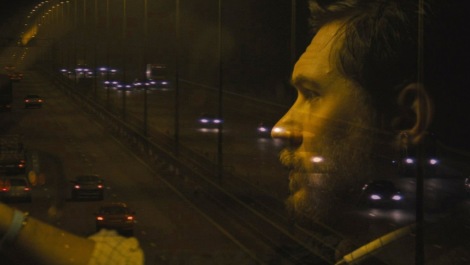Locke

Never mind Jean-Luc Godard’s dictum about a girl and a gun being all that’s required to a make a film – Steven Knight (writer of Dirty Pretty Things and Eastern Promises) here proves that Tom Hardy’s granite face and a speakerphone will do just fine. In fact, the Brit filmmaker squeezes white-knuckle tension from a scenario so low-key and minimalist it could unfold as a release-set stage play.
Hardy is Ivan Locke, driving a BMW from Birmingham to Croydon. It’s late evening. Darkness envelops the car. Sodium streetlights scroll across the windscreen. Locke is on his buzz, soothing nerves, stemming tears, staving off disaster. He is, as his name suggests, a controlled, trusty man, a construction engineer with a rock-solid home life. But everything is about to crumble, thanks to a past indiscretion we won’t spoilerise here.
The calls are to his wife (Ruth Wilson), telling her of his indiscretion and his whereabouts, and to his work supporter (Andrew Scott) to clarify he won’t be there for a essential concrete pour laying the foundations of a skyscraper – a job worth £11m. Also on speed dial are his irate boss, his teenage son and one other whose identity is key to the plot. Each voice is vivid, painting pictures that open out the drama from the tin box gliding through the night, but Hardy’s is the only face on screen.
Speaking in a southern Welsh burr and wearing a jumper as woolly as his beard, the actor is as small here as he was big in The Dark Knight Rises and Bronson. With his marriage dynamited and his career collapsing, he rubs at his mouth and presses at his temples but otherwise tamps down emotions like packed cement. This is an ordinary man trapped in an extraordinary situation but not of the kind we’re used to considering on screen; neither explosions nor chases arrive to quicken viewers’ pulses but the insistent bleep of call waiting. It’s a remarkable performance.
Written by Knight in a week and shot in two, Locke is not without its incorrect turns. Perhaps not trusting his script and his leading man as much as he should, Knight cuts between angles with distracting urgency, manufacturing ‘energy’ when holding shots would better serve the claustrophobia. Similarly, a backstory involving Locke’s mistreatment by his father is overripe exposition, too keen to clarify our hero’s pathological insistence on clenching his emotions and offering immovable support in all situations.
But otherwise Knight’s micro-thriller is a triumph, not only boasting superior sound design and lighting to thicken the atmosphere but managing to make detailed monologues about pouring concrete edge-of-your-seat stuff. Well worth taking for a spin. A Making Of lasts all of five minutes, but there’s a full-length commentary (albeit with Knight riding solo through the night).
![]()












